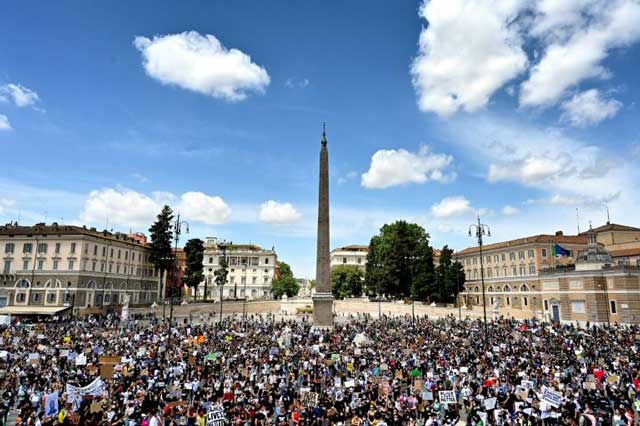
Madrid, Spain | AFP | Chanting for justice, thousands of protesters rallied in the streets of Spain and Italy on Sunday joining a wave of global demonstrations sparked by the death of African American George Floyd at the hands of US police.
A video of the incident with Floyd pleading for his life in Minneapolis as a white police officer knelt on his neck has prompted angry rallies from London to New York, even as countries continue to discourage large gatherings to curb the coronavirus pandemic.
Several thousand people massed on Sunday outside the US embassy in Madrid, repeating “I cannot breathe”, Floyd’s last words as he was asphyxiated by the officer, and demanding racial justice.
“Racism knows no borders,” said Leinisa Seemdo, a 26-year-old Spanish translator from Cape Verde. “In all the countries where I have lived, I have experienced discrimination because of the colour of my skin.”
At a police cordon, they knelt in silence in a gesture against racism first made by American football player Colin Kaepernick in 2016.
Rome’s Piazza del Popolo (“People’s Plaza”) also fell silent for eight minutes — around the time Floyd was pinned down by the white police — with thousands of people taking a knee in memory of Floyd, their fists in the air.
“We can’t breathe,” shouted the crowd, after the collective silence.
“It’s really hard to live here,” said Senegalese migrant Morikeba Samate, 32, one of the thousands to have arrived in Italy after risking the perilous crossing across the Mediterranean.
Opposition to that wave of migration buoyed the far-right in Italy and elsewhere in Europe, creating a culture of mistrust those in the crowd said needed to end.
“There are so many people our age in the street,” said one young Italian, 17-year-old Eleonora, who showed up with her friend holding signs. “It’s important to be here.”
Floyd’s death last month has unleashed the most serious civil unrest in America since Martin Luther King was assassinated in 1968.
Tens of thousands of protesters have rallied this week across the country from New York and Washington to San Francisco.
The white officer, Derek Chauvin, has been charged with second-degree murder and his three fellow officers were also arrested.
– ‘No Justice, No Peace’ –
More than 1,000 people — most wearing masks — also gathered on Sunday at a Black Lives Matter demonstration near the US embassy in Budapest.
Demonstrators held up banners reading “Police everywhere – justice nowhere” and “No Justice – No Peace” and kneeled for eight minutes as other protesters around the world have done.
“We have come together to stand up against racism,” Hungarian reggae singer G Ras told cheering protesters. “If we want to live in a better world, we need to radically change the way we live.”
In Spain, rallies were planned in 10 cities, from Pamplona in the Basque Country to the Canary Islands off the coast of Africa.
In Barcelona, in the north of the country, hundreds of demonstrators filled Sant Jaume square in front of the regional government headquarters.
Other demonstrations were planned during the day in Copenhagen, Brussels, Glasgow and London, where on Saturday a peaceful demonstration of thousands of people erupted into scuffles.
As countries begin to emerge from lockdowns, governments are struggling to balance people’s need to express anger against the risks of protests spreading cases of the disease that has killed nearly 400,000 worldwide.
Tens of thousands of Australians on Saturday defied Prime Minister Scott Morrison’s call to “find a better way”, there were marches in France, and protesters in Britain ignored officials warning against large gatherings.
Floyd’s death came during a pandemic that has disproportionately affected black people and ethnic minorities in global centres such as London and New York.
The historic economic downturn triggered by the virus lockdowns has also statistically affected the poor and marginalised more.
That combination of economic woes, social tensions and anger at US President Donald Trump’s response, has refocused attention on the world’s racial divides like few other events since the 1960s.
 The Independent Uganda: You get the Truth we Pay the Price
The Independent Uganda: You get the Truth we Pay the Price



